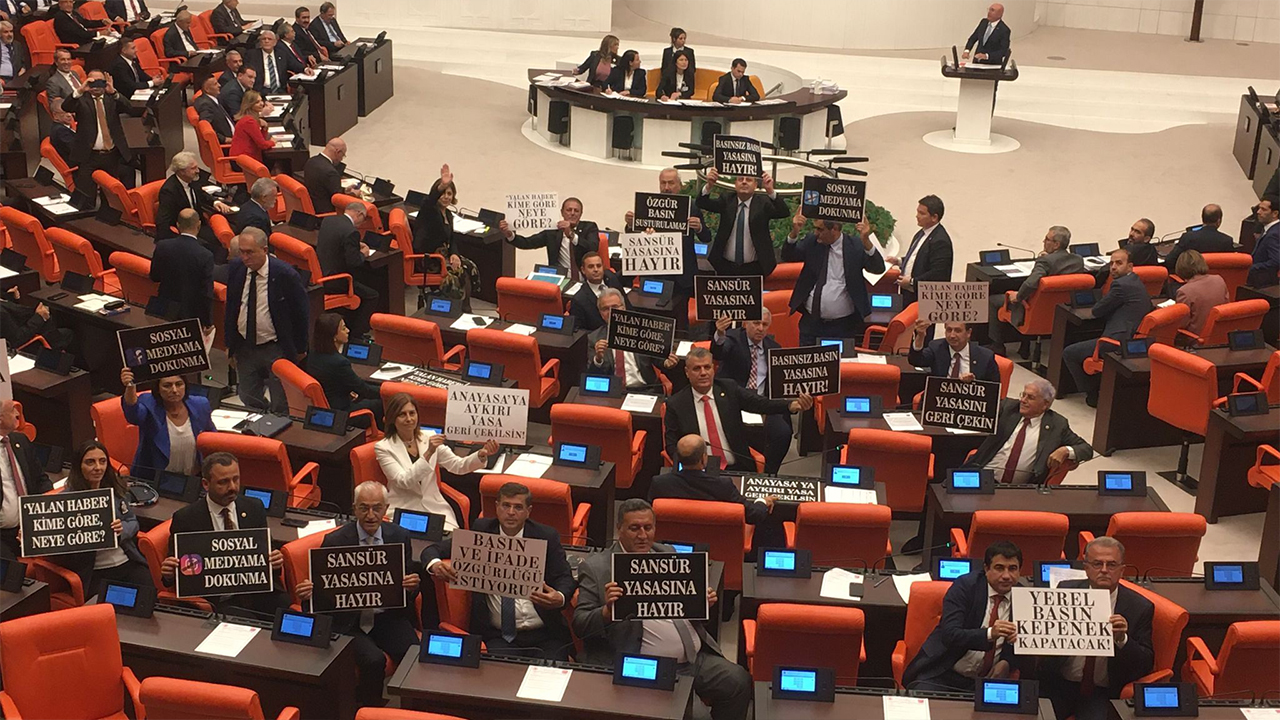[
The disinformation law, which the opposition defines as the ‘censorship law’, was adopted by the Grand National Assembly of Turkey (TBMM) late on Thursday evening with the votes of the ruling Justice and Development Party (AKP) and its far-right ally, the Nationalist Movement Party (MHP).
The most controversial article, article 29 of the 40-article draft bill, includes social media posts and adds the crime of “publicly disseminating misleading information” to the Turkish Penal Code. According to this crime, those who broadcast or publish anything “to cause anxiety, fear or panic, to disrupt the internal and external security of the country, public order and public peace” will be sentenced to imprisonment from one to three years. If the perpetrators commit the crime “by concealing their true identity” or “within the framework of an illegal organisation’s activity”, the penalty is increased by half.
While the articles of the law were being discussed in the parliament, many objections came from the opposition side. Opposition parties argued that the new law drafted by the AKP and MHP would impose a major restriction on freedom of thought. During the parliamentary session, the MPs of the opposition parties protested and called for an amendment to remove or amend Article 29 from the text of the law. Still, these calls did not change the result of the vote.
Meanwhile, the main opposition Republican People’s Party (CHP), is preparing to challenge the bill at the Constitutional Court. CHP’s parliamentary deputy chair, Engin Altay and chair for media and communication, Tuncay Özkan, held a press conference at the TBMM on Thursday and said, “If the bill passes, we are definitely planning to go to the Constitutional Court the day after it is published.”
Amnesty International released a statement in which the law is defined as “tightening the Government’s grip over social media platforms and news websites and criminalising the sharing of information that is deemed false” on Friday.
Güney Yıldız, Regional Researcher at Amnesty International, said: “Today is yet another dark day for freedom of expression online and press freedom in Turkey.”
A total of 22 international organisations, including Reporters Without Borders (RSF), International Press Institute (IPI), Committee to Protect Journalists (CPJ), European Federation of Journalists (EFJ) and PEN International, called on the MPs to vote against the bill on Thursday.
The statement follows: “The bill provides a framework for extensive censorship of online information and the criminalisation of journalism, which will enable the government to further subdue and control public debate in the lead up to Turkey’s [Türkiye] general elections in 2023.”
Journalists’ Union of Turkey (TGS) protested against the bill by leaving the general assembly hall wearing black masks during the session.
The Parliamentary Assembly of the Council of Europe’s Turkey report, which was discussed and accepted on Wednesday, also contains harsh criticisms of the disinformation law.
Turkish President Recep Tayyip Erdoğan, reacting to some of the posts made on social media after the big fires that occurred across the country in the summer of last year, announced that legal arrangements would be made to “fight disinformation and fake news”. The bill was first submitted to parliament in June.
Source:MedyaNews



